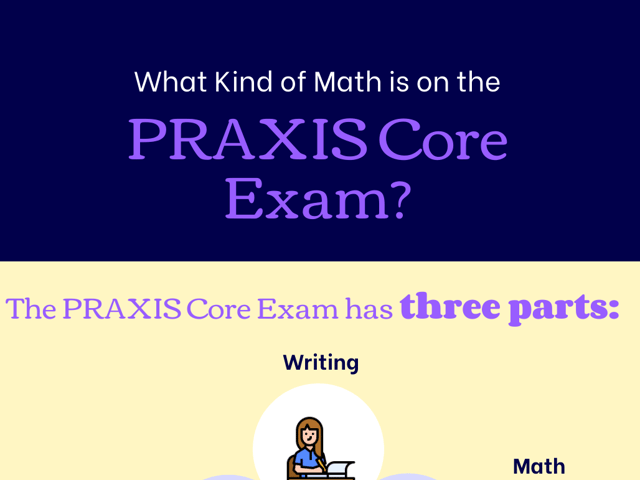
How Long Should I Study for the Praxis?
Do you have a passion for teaching? Teachers play a central role in guiding, developing, and inspiring every new wave of learners each year.
Teaching is also rewarding. At least 65% of public school teachers reported they would not leave their current careers, even for a new one with higher pay.
To successfully start your teaching career, you may have to pass the Praxis Exam. Like all tests, it’s best to go into Praxis fully prepared. This article goes over everything you need to know about Praxis Core prep so you can take it with confidence.
Importance of the Praxis Exam
If you live in a state or U.S. territory that uses Praxis tests, it’s critical to your career as an educator. These tests are an integral part of the teacher certification process.
The Praxis exam can be a requirement at any point before, during, or after your teacher training, licensing, and/or certification. Failure to pass the Praxis can put your career ambitions on hold.
There are three main Praxis Exams:
-
Praxis Core Academic Skills for Educators Tests
-
Praxis Subject Assessments
-
Praxis Content Knowledge for Teaching Assessments
Praxis Core is a part of college admission requirements for teaching programs. It’s generally the first Praxis exam prospective students will take when studying to become a teacher.
Your licensing requirements may also factor in your Praxis Core scores, so you’ll want to score as high as you can on these tests.
How to Prep for the Praxis (Core)
Although exam difficulty is subjective, you should still prepare for the Praxis. Data shows that at least 25%-30% of test takers who fail do not retest, meaning those programs lose around 1/4 of prospective teachers to test failure alone.
Prepping for the Praxis is relatively straightforward:
-
Find out your state’s requirements.
-
Familiarize yourself with the test format and scores.
-
Go over the test material.
-
Make an effective study plan.
-
Study, study, study.
-
Practice taking the test.
-
Prepare for your testing day(s).
-
Take the test and wait for your scores.
After your scores roll in, you can plan your next step in the teaching certification process. Although you should be well prepared, it never hurts to plan for a retest just in case. The program requires 28 days between retakes.
Finding Your State’s Praxis Exam Requirements
The Educational Testing Service manages the Praxis Exam. It’s currently used in 46 states and several U.S. territories. Only four states do not use Praxis tests in any capacity:
-
Arizona
-
Florida
-
Illinois
-
Michigan
In addition to the 46 states, Praxis is also used in these federally administered places:
-
District of Columbia
-
American Samoa
-
Guam
-
Northern Mariana Islands
-
U.S. Virgin Islands
Each state and territory has its own program requirements, which can be found through a comprehensive ETS portal. In addition to testing, each state also has its own minimum scoring requirements.
Praxis Core Format and Scores
The Praxis Core assesses your academic readiness in three main subjects:
-
Reading
-
Writing
-
Mathematics
All three test sections are computerized. While the test is only available in English, eligible PLNE test takers will have extra time for completion.
Basic Format
You can take all three test sections at once, or schedule to take the sections separately. The test code for the combined test is 5752, and the total time for completion is 4 hours and 30 minutes.
Whether you take them separately or all at once, each section will have a specific completion time for a set number of questions. The question formats also differ by section.
Reading Test (Code 5713)
The reading test format is as follows:
-
Question format: Selected-response (multiple choice)
-
Number of questions: 56
-
Completion time: 85 minutes
The reading test is the most straightforward of all the tests. Answers use the standardized testing form, where you select the correct answer from the choices provided. Only one answer will be correct.
Writing Test (Code 5723)
The writing test format comes in two parts. The first part consists of:
-
Question format: Selected-response (multiple choice)
-
Number of questions: 40
-
Completion time: 40 minutes
The second part is a writing exercise. You will write two essays:
-
Essay 1: Argumentative
-
Essay 2: Informative/explanatory
-
Completion time: 60 minutes (30 minutes each)
The essays are not creative writing exercises. Writers must use sources and facts, and improperly formatted sources and quotations will be considered plagiarism.
Math Test (Code 5733)
The math test has three question format types:
-
Standard selected-response (only one answer is correct)
-
Multi-option selected-response (one or more answers are correct)
-
Numeric entry (blank, no response selections given)
This section also has the same number as the reading section, with a little more extra time:
-
Number of questions: 56
-
Completion time: 90 minutes
Calculators are not permitted unless specifically stated. The Praxis Core provides a basic four-function calculator on-screen during the test.
Scoring
ETS will provide a score report after you complete your test. The estimated wait time for each section is:
-
Reading: 20 calendar days
-
Writing: 20 business days
-
Math: 20 calendar days
ETS will provide a comprehensive report of your scores. These include:
-
Your score
-
Your pass/fail status
-
Possible score ranges
-
Raw points possible
-
Standard averages
The passing score differs by state and test section. You can look up your state or agency’s current minimum requirements using this tool:
-
Select: By test or test group
-
Select: 57xx Core Academic Skills for Educators
The “State or Agency” option includes all available Praxis tests. If you use that option, verify you have the correct test code for the applicable test.
Studying for the Praxis
Experts recommend at least 2-3 months of study before attempting the Praxis. If you’ve been out of school and other learning environments for a while, you may need a few weeks longer.
Test Material
The test material will help you plan out your study guide schedule. Your study time is valuable, so don’t waste study sessions on material that’s not tested.
You can use comprehensive, up-to-date study guides to go over what’s on the test. The Praxis tests have undergone major revisions, so always make sure you have the latest study resources available.
Making a Study Plan
An effective study plan breaks down every topic into a schedule. There are several study plan tools to help you organize the study material into a workable schedule of study sessions.
Study sessions are actually more effective if they are short and structured. Our brains tend to lose focus after an hour of intense study time. If you plan on studying several hours per day, use manageable sessions of 40-60 minutes with breaks.
Study, Study, Study
Study methods are also key for effective learning. Reading over material is one of the least constructive learning methods by itself.
Study methods should also include retrieval practice, which uses active memory recall. Memory recall is the mental process you will use on exams, but many test-takers mistakenly overlook this study method.
To stretch your memory recall muscles, you can use tools that force you to come up with the answer all on your own. You can also attempt to answer and score practice questions without any notes, books, or other references.
Online flashcards are effective tools for recall practice. They also aid your memory through repetition and metacognition, which refers to the self-analysis of your learning process.
If you get a flashcard answer wrong, for example, you may reflect on why you didn’t know the answer and think up strategies to remember the correct answer in the future. This deeper learning process is considered metacognition.
Practice Tests
Like flashcards, practice tests are an invaluable retrieval practice aid. They have the added perk of increasing test confidence. If you have test anxiety, practice tests can help reduce the stress that interferes with your test performance.
Adaptive testing is another effective practice test tool. Adaptive testing directly measures your performance and bases new questions on what you got right and wrong. Many online resources include lesson plans that use adaptive testing.
Praxis Test Day Prep
Once you’ve effectively studied and mastered the material, your test day should be near. Praxis tests are available at home or through a testing center. ETS has strict requirements, so getting ready for test day is a critical part of preparing for the Praxis.
If you go through a testing center, ETS has policies on what you can and cannot bring. Required items include:
-
Valid photo ID (two forms of ID are encouraged)
-
Face mask (no matter what the local/state policy is on face covering requirements)
-
Admission ticket
Prohibited items include:
-
Watches
-
Cell phones
-
Portable electronic devices
-
Headsets
-
Jewelry that’s not a wedding or engagement ring
-
Wearable accessories such as scarfs, headbands, neckties, and hats
You may be able to store food, drinks, and medications for test breaks. You will be required to store items such as handbags before taking the test.
If you take the test at home, the exam will be proctored through ProctorU. This requires the use of a video camera that works correctly on your PC.
Your test day prep should also include getting a good night’s sleep, plenty of water, and adequate food before the test. Skimping on sleep, nutrition, and hydration can negatively interfere with your concentration and focus.
Take Control of Your Future with These Essential Praxis Prep Resources
Praxis tests are a requisite part of your teaching career. In the majority of U.S. states, you are required to take the Praxis to qualify for teaching training, licensing, and certification programs.
Why leave your future up to chance? Union Test Prep has all the top-quality study resources you need just a click away. Check out our free Praxis study tools today!
Keep Reading

PRAXIS Test Blog
What Kind of Math is on the PRAXIS Core Exam?
The PRAXIS Core Exam has three parts: reading, math, and writing. The m…

PRAXIS Test Blog
Number and Quantity Formulas for the PRAXIS® Core Academic Skills for Educators Mathematics Test
The “PRAXIS Core Academic Skills for Educator: Mathematics” Test (5733)…

PRAXIS Test Blog
Data, Statistics, and Probability Formulas for the PRAXIS® Core Academic Skills for Educators Mathematics Test
The importance of Data, Statistics, and Probability for the “PRAXIS Cor…